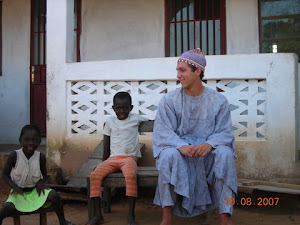I finally have access to email and the internet for a couple of days...
I am back in Kombo for Thanksgiving. All Peace Corps volunteers came to Kombo this year because today was t he celebration of 40th Anniversary of Peace Corps The Gambia. The Peace Corps held Thanksgiving at the US Ambassador's House. Mashed potatoes and pumkin pie have never tasted so good.
he celebration of 40th Anniversary of Peace Corps The Gambia. The Peace Corps held Thanksgiving at the US Ambassador's House. Mashed potatoes and pumkin pie have never tasted so good.
On Saturday I leave to visit my permanent site for a few days. I am excited to finally see where I will be living for the next two years. Training is almost done. After site visit, I have a week left in Kombo and if I pass the language exam, I am sworn in as a peace corps "volunteer" (promoted from trainee).
I have been in The Gambia for two months, but it is amazing how quickly my perspective has changed. Around our dormitories here in Kombo, I was amazed at how nice the buildings looked. I remember when I first arrived, I thought the area looked a little run down and dirty. I also had a bag of fritos the other day. I like all chips except fritos for which I have a particular dislike, but they tasted great. We joke here that somethings are Gambian good. Items which normally taste bad are considered good.
I am back in Kombo for Thanksgiving. All Peace Corps volunteers came to Kombo this year because today was t
 he celebration of 40th Anniversary of Peace Corps The Gambia. The Peace Corps held Thanksgiving at the US Ambassador's House. Mashed potatoes and pumkin pie have never tasted so good.
he celebration of 40th Anniversary of Peace Corps The Gambia. The Peace Corps held Thanksgiving at the US Ambassador's House. Mashed potatoes and pumkin pie have never tasted so good.On Saturday I leave to visit my permanent site for a few days. I am excited to finally see where I will be living for the next two years. Training is almost done. After site visit, I have a week left in Kombo and if I pass the language exam, I am sworn in as a peace corps "volunteer" (promoted from trainee).
I have been in The Gambia for two months, but it is amazing how quickly my perspective has changed. Around our dormitories here in Kombo, I was amazed at how nice the buildings looked. I remember when I first arrived, I thought the area looked a little run down and dirty. I also had a bag of fritos the other day. I like all chips except fritos for which I have a particular dislike, but they tasted great. We joke here that somethings are Gambian good. Items which normally taste bad are considered good.

